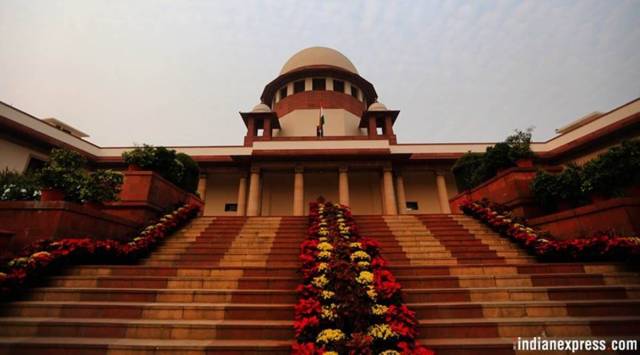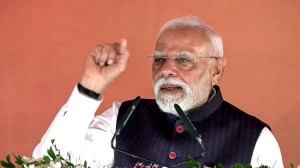Asserting that wearing of a hijab is mandated by the Quran, which Muslims believe is “perfect for all times to come”, appellants before the Supreme Court in Karnataka hijab ban case on Thursday questioned conclusions in the High Court judgment linking its relevance to passage of time since the practice originated.
They submitted that to say verses of the Quran “have become obsolete is bordering on blasphemy”.

A bench of Justices Hemant Gutpa and Sudhanshu Ddulia, meanwhile, told Advocate Nizam Pasha, who appeared for appellant Muslim parties, to not draw parallels between wearing of hijab with members of Sikh community wearing turbans.
Story continues below this ad
“The 5 Ks (kesh, or hair; kanga, comb; kara, bracelet; kadhera, a white undergarment; and kirpa, curved knife) are well established. 1925 Act prescribes that. The one who doesn’t follow the 5 Ks is not a Sikh… Under Article 25, carrying a kirpan is permissible. In a way that (separate rights of Sikhs) is recognised by the Constitution. Don’t compare…because they are statutorily recognised for over 100 years…. Actually it’s more than 500 years,” Justice Gupta said as Pasha cited the example of Sikhs wearing turban.
The counsel said several Sikh boys in his class wore a turban or a patka of the same colour as the uniform. “The fact that it doesn’t affect discipline has been established in India…. There will even be Sikh boys who don’t sport long hair, who believe in Sikhism. Will they feel inferior? Should that be a ground for disallowing boys wearing it,” he asked.
The bench, also comprising Justice Sudhashu Dhulia, responded: “Kara or turban, they are different norms of Sikhism, well established and well ingrained in the culture of this country…. Please don’t draw any parallel with Sikhism. That’s what we are saying”.
Pasha said that “my submission is exactly on the same lines…500 years of practice has been suggested. Mine is 1,400 years of practice”.
Story continues below this ad
The court said it will examine his contentions, independent of the Sikh argument.
Pasha also referred to the part of HC judgment which said that “it can be reasonably assumed that the practice of wearing hijab had a thick nexus to the socio-cultural conditions then prevalent in the region”. To arrive at this conclusion, he said, the HC had relied on a commentary from the scriptures, which says “Alas! We must ask ourselves the question: ‘Are these conditions present among us today?’”
Pasha said the question was “rhetorical”, and the “author only says the same condition prevails now…but it’s cited in the wrong context” by HC. “A rhetorical question was posed, which was transposed to hijab to say that therefore this was relevant only to that time as per the understanding and opinion of this author”, which is not the case, he said.
Pasha submitted, “We believe in a God who created time. So to say that with passage of time, this verse has become obsolete or (its) understanding has changed, directly contravenes the verse I have cited…. The last verse of the Quran that was revealed…which, in the understanding of believing Muslims, means that the religion as it stands, the Quran as it stands, is perfect for all times to come…. So to say verses of the Quran have become obsolete is bordering on blasphemy.”
Story continues below this ad
Justice Dhulia told him “don’t go that far” and said that commentators’ views have been cited.
Justice Dhulia asked him not to “that far” and said that commentators’ views have been cited.
But Pasha replied, “The commentators have not said that. The learned judge is saying that.”
Pasha contended that HC had also cited some unrelated verses from Islamic texts about wearing of another apparel — Jilbab — to conclude that wearing of the hijab is not mandatory but is only recommended.
Story continues below this ad
“High Court says it is only directory in the absence of a prescription of penalty or penance for not wearing it. There is no temporal punishment for spiritual acts,” Pasha said. “The Quran says at several places that if you disobey God’s roads, in the afterlife you will find hellfire. That is the compulsion in religion. Religion has spiritual implications for afterlife…. To say because there is no compulsion in religion, so everything in Islam is directory is to take away our Article 25 rights…
“It’s not that you get 80 lashes for not wearing a hijab. That’s not the punishment the Quran speaks of. These are spiritual acts; the punishment for that is spiritual, which is what awaits you in the afterlife.”
Underlining the significance of the hijab, he said “When the Prophet is quoted as saying that your veil is worth the whole world and whatever is there in it and the Quran is saying that obey the God and obey the Apostle, when you put the two together, there can be nothing more essential”.
Pasha contended that “when a believing girl believes that her veil is better than the whole world and whatever in it, to face her with a chance of whether she wants education or veil is actually to tell her she is to be denied an education…”.
Story continues below this ad
Newsletter | Click to get the day’s best explainers in your inbox
Earlier in the hearing, senior advocate Devadatt Kamat, also appearing for the Muslim appellants, said the state government’s February 5 order had cited public order as one of the grounds. But, he argued, “there cannot be a ground that public order will be violated” to deny his clients the right to wear hijab. “It is your duty to create an atmosphere where I can exercise my right in accordance with Article 25.”
Kamat said, “Argument of the state is, if we permit you to wear a headscarf, which I regard as a part of my faith, some other students will [want to wear] orange shawl. Wearing of orange shawl, I don’t think, is an innocent display of faith. It is a belligerent display of religious jingoism — [to say that] you are wearing a headscarf, I will show something to show my religious identity.”
Article 25, he said, doesn’t protect that — “it is only the innocent display of faith that Article 25 protects”.
Story continues below this ad
He also submitted that the HC had said that freedom of conscience and freedom of religion are mutually exclusive and added, “this is totally erroneous”.
The arguments will resume on September 12.









